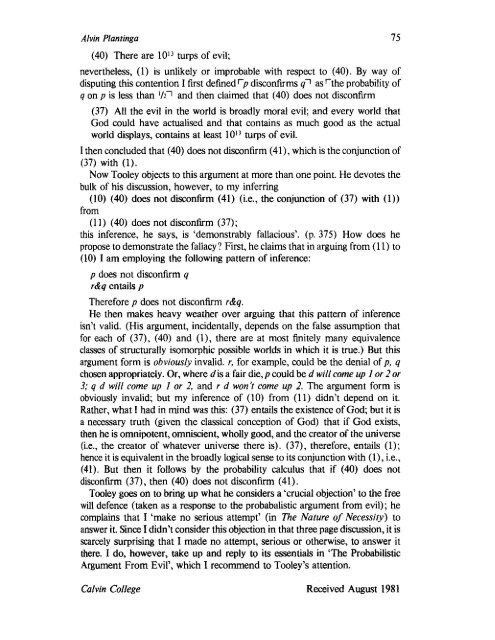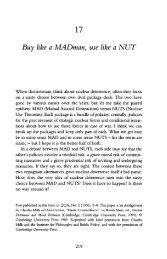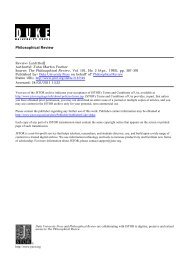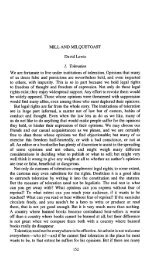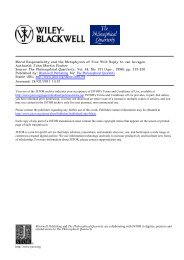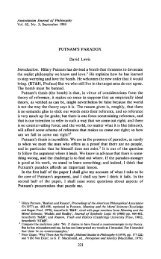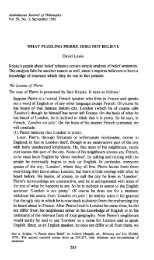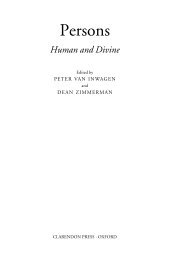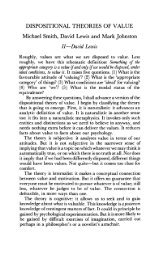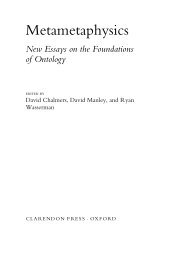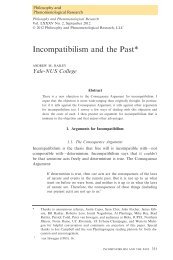Tooley and Evil - Andrew M. Bailey
Tooley and Evil - Andrew M. Bailey
Tooley and Evil - Andrew M. Bailey
- No tags were found...
You also want an ePaper? Increase the reach of your titles
YUMPU automatically turns print PDFs into web optimized ePapers that Google loves.
Downloaded by [University of Notre Dame] at 11:51 14 April 2012Alvin Plantinga 75(40) There are 1013 turps of evil;nevertheless, (1) is unlikely or improbable with respect to (40). By way ofdisputing this contention I first defined rp disconfirms q7 as r-the probability ofq on p is less than 1/27 <strong>and</strong> then claimed that (40) does not disconfirm(37) All the evil in the world is broadly moral evil; <strong>and</strong> every world thatGod could have actualised <strong>and</strong> that contains as much good as the actualworld displays, contains at least 1013 turps of evil.I then concluded that (40) does not disconfirm (41), which is the conjunction of(37) with (1).Now <strong>Tooley</strong> objects to this argument at more than one point. He devotes thebulk of his discussion, however, to my inferring(10) (40) does not disconfirm (41) (i.e., the conjunction of (37) with (1))from(11) (40) does not disconfirm (37);this inference, he says, is 'demonstrably fallacious'. (p. 375) How does hepropose to demonstrate the fallacy? First, he claims that in arguing from (11) to(10) I am employing the following pattern of inference:p does not disconfirm qr&q entails pTherefore p does not disconfirm r&q.He then makes heavy weather over arguing that this pattern of inferenceisn't valid. (His argument, incidentally, depends on the false assumption thatfor each of (37), (40) <strong>and</strong> (1), there are at most finitely many equivalenceclasses of structurally isomorphic possible worlds in which it is true.) But thisargument form is obviously invalid, r, for example, could be the denial of p, qchosen appropriately. Or, where dis a fair die, p could be d will come up I or 2 or3; q d will come up 1 or 2, <strong>and</strong> r d won't come up 2. The argument form isobviously invalid; but my inference of (10) from (11) didn't depend on it.Rather, what I had in mind was this: (37) entails the existence of God; but it isa necessary truth (given the classical conception of God) that if God exists,then he is omnipotent, omniscient, wholly good, <strong>and</strong> the creator of the universe(i.e., the creator of whatever universe there is). (37), therefore, entails (1);hence it is equivalent in the broadly logical sense to its conjunction with (1), i.e.,(41). But then it follows by the probability calculus that if (40) does notdisconfirm (37), then (40) does not disconfirm (41).<strong>Tooley</strong> goes on to bring up what he considers a 'crucial objection' to the freewill defence (taken as a response to the probabalistic argument from evil); hecomplains that I 'make no serious attempt' (in The Nature of Necessity) toanswer it. Since I didn't consider this objection in that three page discussion, it isscarcely surprising that I made no attempt, serious or otherwise, to answer itthere. I do, however, take up <strong>and</strong> reply tO its essentials in 'The ProbabilisticArgument From <strong>Evil</strong>', which I recommend to <strong>Tooley</strong>'s attention.Calvin College Received August 1981


